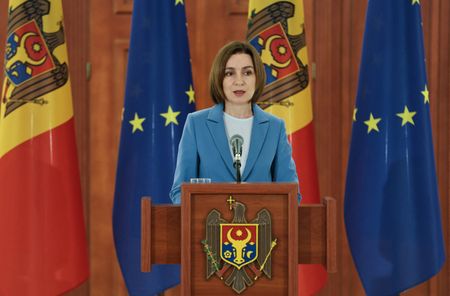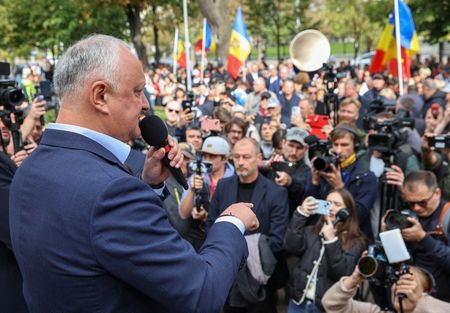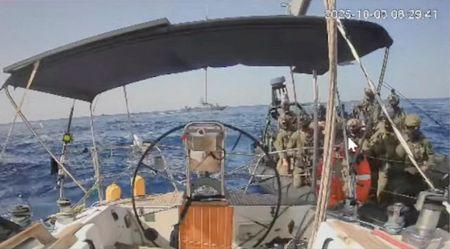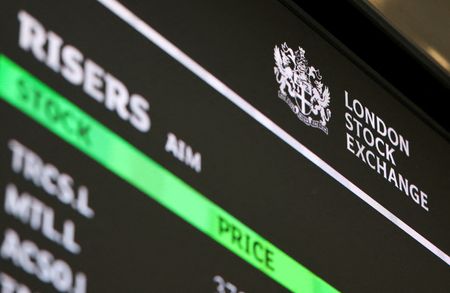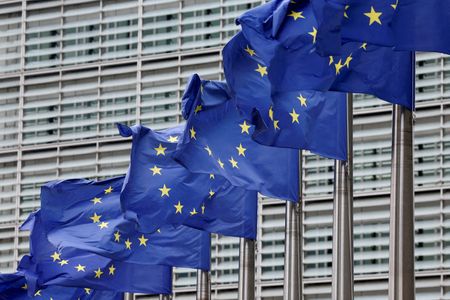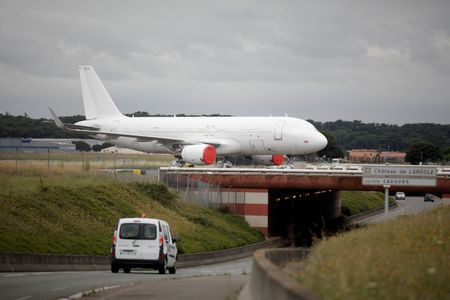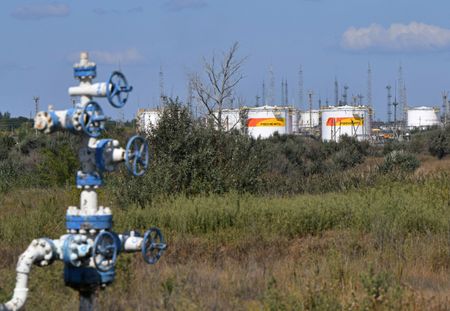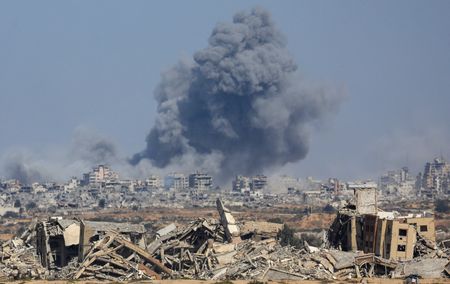By Dan Peleschuk
CHISINAU (Reuters) -New power lines and wind farms; swift prosecutions of alleged Russian-backed saboteurs; winning hearts and minds. Moldova’s government is focusing on its next battles to secure a future in Europe and break out of Russia’s grasp.
After the ruling pro-EU party’s triumph in a high-stakes parliamentary election on Sunday, current and former officials expressed both relief and urgency around what they have described as a historic chance.
“This is a race against time,” said Olga Rosca, President Maia Sandu’s foreign policy adviser, of Chisinau’s goal of joining the EU by 2030.
With no national elections planned for three years, Sandu’s Party of Action and Solidarity (PAS) must now build on early successes and address long-term pain points ranging from energy security to political divisions.
And while the European Union has welcomed the election outcome, accession is notoriously tough and can take many years, requiring both broad reforms like cleaning up the judiciary and detailed efforts like lining up myriad regulations.
THWARTING FUTURE RUSSIAN INTERFERENCE
In a country where political power has alternated between pro-European and pro-Russian parties for decades – and where Moscow still has troops stationed in a pro-Russian separatist region – authorities say they must remain vigilant.
The Organization for Security and Cooperation in Europe, which sent an observer mission to Moldova, called the hybrid threats from Russia in the buildup to voting “unprecedented”.
Moscow has denied trying to influence the vote to undermine Moldova’s turn to the West and says the accusations are part of a campaign to foster anti-Russian sentiment. Russian Foreign Minister Sergei Lavrov said he believed the election had been openly manipulated. He did not elaborate.
Alleged Russian attempts to buy votes, spread disinformation and stoke protests failed thanks to tight coordination among security agencies, said Viorel Cernauteanu, chief of Moldova’s police force.
Stiffer penalties against vote selling discouraged would-be offenders, and sweeping raids were widely publicised into illegal party financing and efforts to disrupt the election.
Still, Sandu and other senior officials say Moscow-backed interference will not end.
Cernauteanu said a key to preventing future destabilisation efforts would be ensuring swift prosecution of those arrested in recent weeks. Cases involving lower-level violations from prior elections languished for years, but new suspects include higher-level organisers, some of them former police officers.
SHORING UP ENERGY SECURITY
For decades, Moldova’s dependence on Russian energy was its biggest weakness, with Moscow able to raise or lower prices to reward or punish governments in Chisinau. Moscow’s grip on energy has finally been pried loose over the past three years, with Moldova now getting supplies from Romania and Ukraine.
But that still requires overhauling an outdated grid and building major new power lines across Moldova’s rolling hills to strengthen connections to the European system.
Higher energy prices have cut into living standards in one of Europe’s poorest countries. Officials hope to keep tariffs down by building up a renewable energy sector, said Dorin Junghietu, Moldova’s energy minister.
Wind and solar capacity have already increased more than fivefold over the past several years, he said, to nearly 800 megawatts from around 120. The government’s decade-end goal is for 30% of Moldova’s energy to come from renewables. Homes, schools and hospitals, many dating to the Soviet era, will need better insulation.
“Society started to understand that, really, Russia was always using energy as a weapon against Moldova,” said Junghietu.
REACHING OUT TO THE DISAFFECTED
While PAS generally performed well across the country, political rifts remain, partly between the Romanian-speaking majority and minority Russian speakers.
The pro-Russian Patriotic Bloc still won 24% of the vote, beating PAS by double digits in some northern districts such as the industrial city of Balti. In Gagauzia, a small autonomous Turkic-speaking ethnic minority region in the south, the Patriotic Bloc took 82% versus just 3% for PAS.
The opposition was able to exploit economic grievances and uncertainty over the cost of closer EU ties. In a referendum last year, voters backed joining the EU, but by only a tiny margin.
Dumitru Alaiba, a former deputy prime minister overseeing economic development and digitalisation, said the government must pursue an extensive on-the-ground campaign to prove how a future in Europe will impact Moldovans’ lives for the better.
“It’s an entire generation’s worth of work,” he said.
As it approaches the EU’s doorstep, Moldova may finally have to tackle another challenge it has long put off: the fate of its eastern Transdniestria region, where pro-Russian separatists broke from Chisinau’s rule in a brief war in the early 1990s.
Though the conflict remains quiet and worries of a spillover of the Ukraine war have so far proved unfounded, there has been virtually no progress resolving the standoff for decades.
Moldova’s third-largest city, some of the country’s most important industrial sites and a long stretch of its border with Ukraine all remain outside the government’s control, protected by a small garrison of Russian troops.
“We don’t have any more excuses not to deal with this question,” said Anastasia Pociumban of the German Council of Foreign Relations.
(Reporting by Dan PeleschukEditing by Mike Collett-White and Peter Graff)

